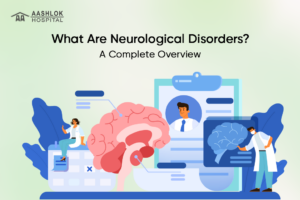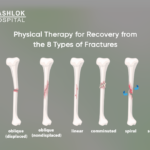What Are Neurological Disorders? A Complete Overview

Neurological disorders are conditions that affect the brain, spinal cord, and nerves, leading to a wide range of symptoms that can impact movement, cognition, and overall quality of life. From the occasional headache to severe conditions like Parkinson’s disease and Alzheimer’s, these disorders are increasingly common. Neurological symptoms, such as memory loss, tremors, and seizures, can often be the first signs of underlying conditions. At Aashlok Hospital, we specialize in diagnosing and treating various types of neurological disorders with personalized care to manage and alleviate symptoms, helping you regain control of your life and health.
What Are Neurological Disorders?
Neurological disorders are a broad range of conditions that affect the nervous system, including the brain, spinal cord, and peripheral nerves. These disorders can disrupt the normal functioning of the nervous system, leading to symptoms such as memory loss, tremors, muscle weakness, coordination issues, and even changes in mood or behavior. They can arise from various causes, including genetics, infections, injuries, or diseases like Alzheimer’s, Parkinson’s, epilepsy, and multiple sclerosis. Early detection and proper treatment are crucial to managing these conditions and improving the quality of life for affected individuals.
Also Read : TREATMENT FOR NEUROLOGICAL DISORDER
Causes of Neurological Disorders
Neurological disorders can be caused by a variety of factors, often involving complex interactions between genetics, environmental influences, and lifestyle choices. Some common causes include:
- Genetic Factors: Many neurological disorders, such as Huntington’s disease or certain types of epilepsy, are inherited and caused by genetic mutations passed down from parents.
- Injuries and Trauma: Head injuries, spinal cord injuries, or traumatic brain injuries can disrupt the nervous system, leading to disorders like post-traumatic stress disorder (PTSD) or brain damage.
- Infections: Bacterial, viral, or fungal infections affecting the brain or spinal cord, like meningitis or encephalitis, can cause neurological complications.
- Chronic Diseases: Conditions like diabetes or hypertension can damage the nerves over time, leading to peripheral neuropathy or other neurological issues.
- Lifestyle Factors: Poor diet, lack of physical activity, excessive alcohol consumption, or smoking can increase the risk of developing neurological disorders by affecting brain health.
- Environmental Toxins: Exposure to harmful chemicals or pollutants can have a detrimental impact on the nervous system, potentially leading to neurological diseases.
Symptoms of Neurological Disorders
The symptoms of neurological disorders can vary widely depending on the type and severity of the condition. However, here are some common signs that our neurologists mark as red flags and need immediate intervention:
- Physical Symptoms: Muscle weakness, tremors, paralysis, loss of coordination, or difficulty walking.
- Cognitive Symptoms: Memory loss, confusion, difficulty concentrating, impaired judgment, or trouble with problem-solving.
- Sensory Symptoms: Numbness, tingling, or a loss of sensation, often in the hands, feet, or face.
- Speech and Language Issues: Difficulty speaking, slurred speech, or trouble understanding or forming words.
- Emotional Symptoms: Depression, anxiety, mood swings, or personality changes.
- Seizures: Uncontrolled shaking or convulsions that can be associated with conditions like epilepsy.
- Pain: Chronic headaches, back pain, or nerve pain such as burning or sharp sensations.
Also Read : Brain Health Tips to Prevent Neurological Disorders
Types of Neurological Disorders
Neurological disorders can significantly impact a person’s daily life, and understanding them is crucial for early intervention and management. At Aashlok Hospital, we specialize in diagnosing and treating various types of neurological disorders, catering to each patient’s unique needs. Below are some of the most common types of neurological disorders we often come across:
- Neurodegenerative Diseases: Conditions like Alzheimer’s disease, Parkinson’s disease, and Huntington’s disease, which progressively damage nerve cells over time.
- Epileptic Disorders: Epilepsy and other seizure-related disorders that affect brain activity and cause repeated seizures.
- Demyelinating Diseases: Multiple sclerosis is a prime example, where the protective covering of nerve fibers is damaged, impairing nerve function.
- Cerebrovascular Diseases: These include strokes and transient ischemic attacks (TIAs), which occur when blood flow to the brain is interrupted.
- Neuropathies: Conditions such as peripheral neuropathy and Guillain-Barré syndrome that affect the nerves outside the brain and spinal cord.
- Movement Disorders: These include tremors, dystonia, and other conditions that disrupt voluntary movement.
- Headaches: Chronic conditions like migraines and cluster headaches that impact daily life.
Neurological Disorders Treatment
At Aashlok Hospital, we offer a comprehensive range of treatments for neurological disorders to help manage symptoms and improve the quality of life. Our team of neurologists delivers customized care tailored to each patient’s condition, using the most advanced technologies and facilities. Below is a spectrum of our neurological treatments:
-
Medication Management
We prescribe safe medications to manage your neurological symptoms, control disease progression, and improve your quality of life. Our neurologists carefully monitor your condition to adjust medications as needed, ensuring optimal results. Whether it’s for pain relief, muscle relaxation, or cognitive support, our treatments are designed to help you feel better every day.
-
Physical Therapy
Our specialized physical therapy programs for neurological disorders are designed to improve mobility, strength, and coordination. Whether you’re recovering from surgery or managing a chronic condition, our therapists work closely with you to develop a plan that addresses your specific needs, helping you regain independence and prevent further complications.
-
Occupational Therapy
Occupational therapy is key to assisting patients in performing daily tasks and activities. We focus on enhancing fine motor skills, cognitive abilities, and problem-solving techniques to ensure patients can live as independently as possible, even with neurological impairments. Our tailored programs are aimed at improving the ability to perform both simple and complex tasks.
-
Speech and Language Therapy
If neurological conditions affect your ability to speak or understand language, our speech and language therapy is here to help. Our certified therapists work on improving speech clarity, understanding, and communication abilities, enhancing both verbal and non-verbal interactions. This therapy can significantly improve your ability to engage in social and professional settings.
-
Surgical Interventions
For certain neurological disorders, surgical interventions may be necessary. Our skilled neurosurgeons conduct various surgical procedures to treat conditions like brain tumors, spinal cord injuries, or deep brain stimulation for movement disorders. With state-of-the-art technology and years of experience, we ensure the best outcomes for our patients.
-
Lifestyle and Nutritional Counseling
We provide expert lifestyle and nutritional counseling to promote brain health and overall well-being. Our team helps you incorporate brain-boosting diets, stress management techniques, and regular exercise into your routine, giving you the best chance to manage your condition and prevent further neurological damage.
Conclusion
Neurological disorders can deeply affect a person’s daily life, from motor skills to cognitive abilities. Neurological symptoms such as memory loss, tremors, and weakness often point to underlying conditions that require professional attention. At Aashlok Hospital, we are committed to providing compassionate care to help you manage these challenges effectively. Our dedicated team is here to guide you through every step of your neuro-treatment journey. Reach out to us today and start your path toward optimal neurological health!
FAQs
What Are the Most Common Types of Neurological Disorders?
The most common neurological disorders include Alzheimer’s disease, Parkinson’s disease, epilepsy, multiple sclerosis, stroke, and migraines. These conditions can affect various aspects of brain and nerve function, leading to symptoms such as memory loss, movement problems, and seizures.
What Are the Causes of Neurological Disorders?
Neurological disorders can be caused by a variety of factors, including genetic predisposition, head injuries, infections affecting the nervous system, chronic diseases like diabetes, and environmental toxins. Lifestyle factors such as poor diet, lack of exercise, and excessive alcohol consumption can also increase the risk.
What Are the Early Signs of Neurological Disorders?
Early neurological symptoms may include memory problems, difficulty concentrating, tremors, muscle weakness, coordination issues, or changes in mood and behavior. Recognizing these signs early can help with prompt diagnosis and treatment, improving outcomes.
How Can You Prevent Neurological Disorders?
While some neurological disorders cannot be prevented, certain lifestyle changes can reduce the risk. Maintaining a healthy diet, exercising regularly, managing stress, avoiding smoking, and staying mentally active can help promote brain health and reduce the likelihood of developing neurological conditions. Regular check-ups with a healthcare provider also play a crucial role in early detection and prevention.











